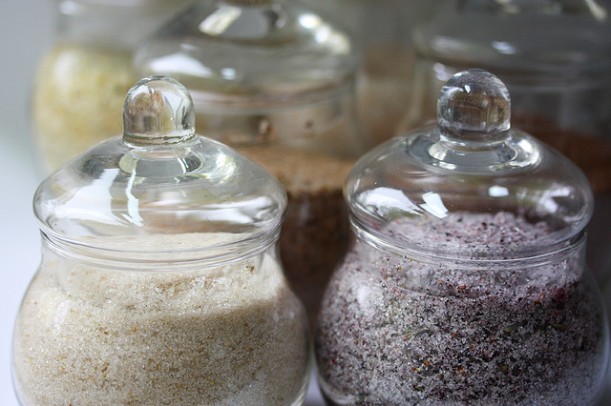Ohhh sugar. We love it, right? But often, it is also the demise of self-control, of overeating, and of our long-term health. Here are three articles that – topically, now in January – look at sugar and its addictive power.

Image by Emilie Hardman, via Flickr CC.
1) First off, this National Geographic piece titled Sugar Love. A not so sweet story tells the fascinating story of the discovery and subsequent domestication of sugar (some 10,000 years ago on the island of New Guinea) and its triumph over the globe. It slowly spread from island to island, finally reaching Asia and being carried forth by Arab armies – as one historian writes, “Sugar, we are told, followed the Koran.” Once French and British crusaders came across the stuff of miracles, entire markets were built around the rare trickle of Muslim trade, making sugary treats a delicacy only available to nobles in Europe. Now, this next paragraph is so exquisite in linking the history of sugar and, well, the history of mankind that I want to showcase it in its entirety:
In school they call it the age of exploration, the search for territories and islands that would send Europeans all around the world. In reality it was, to no small degree, a hunt for fields where sugarcane would prosper. In 1425 the Portuguese prince known as Henry the Navigator sent sugarcane to Madeira with an early group of colonists. The crop soon made its way to other newly discovered Atlantic islands—the Cape Verde Islands, the Canaries. In 1493, when Columbus set off on his second voyage to the New World, he too carried cane. Thus dawned the age of big sugar, of Caribbean islands and slave plantations, leading, in time, to great smoky refineries on the outskirts of glass cities, to mass consumption, fat kids, obese parents, and men in XXL tracksuits trundling along in electric carts.
Continue reading to follow along on how the obsession with sugar lead to the rise of slavery and the “triangular trade” of commodities and people between the Caribbean, Europe and West Africa. The author also forecasts man’s never-ending want, or even need, of sugar. Look at these stats:
And yet there was no stopping the boom. Sugar was the oil of its day. The more you tasted, the more you wanted. In 1700 the average Englishman consumed 4 pounds a year. In 1800 the common man ate 18 pounds of sugar. In 1870 that same sweet-toothed bloke was eating 47 pounds annually. Was he satisfied? Of course not! By 1900 he was up to 100 pounds a year. In that span of 30 years, world production of cane and beet sugar exploded from 2.8 million tons a year to 13 million plus. Today the average American consumes 77 pounds of added sugar annually, or more than 22 teaspoons of added sugar a day.
The article then takes you skillfully through the medicine of why sugar might be so bad for us (it has to do with the way the liver breaks down fructose, which can lead to metabolic syndrome) and psychology of why we crave it so much (it may have been an evolutionary adaptation to get us through lean times like ice ages). What a great read! But there is more.
2) Next, I have a shorter NPR article that asks “Is Sugar Addiction Why So Many January Resolutions Fail?” and gives highly personal advice on how to overcome the cravings if you have the feeling of being extra sensitive to sugar. First, the author reviews some of the latest scientific findings on sugar addiction though (which I also wrote about here) and then discusses whether it’s best to go cold turkey (although a life with no more refined sugar ever seems to me a life hardly worth living – but maybe that only shows that I’m addicted?) or how to be better at moderating yourself.
3) And last but not least, the BBC showcases Five foods surprisingly high in sugar. Truth is, it becomes harder and harder to know what you eat the more processed foods you consume. Even if you try to eat healthy, you might be imbibing teaspoons and teaspoons of sugar that were added to the most unlikely foodstuffs because sugar enhances taste and sometimes texture. Check out the likely culprits of the BBC, but also turn over your ketchup, barbecue sauce, and salad dressings (amongst others) to look for sugars such as high fructose corn syrup or these other 49 names for sugar on the ingredient list. You might be surprised!
Edited to add:
Well, and as I was scrolling through BBC news today what do I find but a fourth article related to all things sugar! Plus it works really well in the flow of this post, since after exposing the history, the problem and the added complication of sugar consumption, here comes one proactive solution:
4) In the article “Campaigners vow to cut sugar in food“, the BBC introduces the campaign group Action on Sugar, which intends to “help people avoid “hidden sugars” and get manufacturers to reduce the ingredient over time. It believes a 20% to 30% reduction in three to five years [in the UK] is within reach.” If you haven’t had enough, the article gives yet more foods and their sugar content, which sort of makes you wonder… can I eat anything anymore? But if actions groups such as the one profiled are successful, maybe we’ll get back to a situation where we can trust savory foods to be just that – non-sugary.